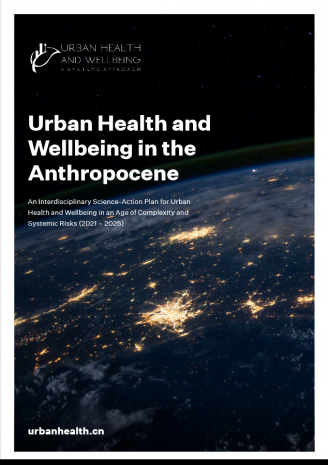This New Science Plan (2021-2025) for ISC’s global interdisciplinary science programme on Urban Health and Wellbeing: A Systems Approach, deviates from its 2011 predecessor in that it makes a shift from ‘improving health and wellbeing of people in cities’ to ‘improving population and planetary health in the context of complex urban systems’. The fundamental difference lies in the recognition that in an age of the Anthropocene a less anthropocentric and more eco-centric view is essential . It recognizes humans as part of global ecosystems, the health of which guarantees more long-term human health and wellbeing, in contrast to achieving human health and wellbeing at the expense of the natural environment and ecosystems.
The science plan’s vision is cities built and governed as nodal points of global urban networks which are resilient or antifragile, learn from shocks and not only adapt to adverse environmental conditions but contribute to create living conditions which are healthy and sustainable for people and the planet.
The goals of the plan include:
- Support efforts for implementing ‘Health in All Policies’ and the ‘Xiamen Call for Action’,
- Lead the development of an interdisciplinary research project,
- Communicate the systems approach to urban heath and wellbeing,
- Inform and develop training and communication material,
- Build networks for collective intelligence on urban health and wellbeing.
This New Science Plan 2021-2025 takes into account the ongoing changing global urban health context as well as the changing science context. It is aligned to the International Science Council’s priority domains and explains how health is an essential component of the major global agreements on cities, carbon mitigation, sustainable development and disaster risk reduction.
In fact, as health is mentioned prominently in all major global agreements, it is well positioned to serve as an integrating concept across all programmes of the International Science Council. Urban health and wellbeing has the potential of bringing diverse science communities, from the data- to the earth sciences together in an accelerated effort to co-produce collective intelligence for sustainable development. This new science plan explains why and how it can also be used as inspiration for post-pandemic strategies of cities attempting to recover, exchange experiences, learn from another and emerge out of the crisis, stronger, healthier, and less fragile than before, due to their attempts in applying systems thinking and multiple variations of a systems approach.

